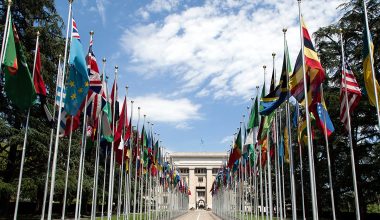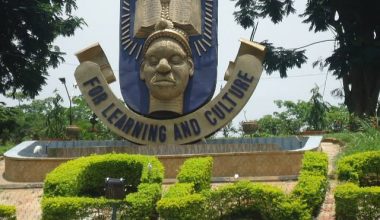The future of every nation lies in the youths, as such proper training on how the government works is needed to raise a crop of future political leaders. That’s why the study
Political Science is necessary. Therefore, Political Science Courses in Nigeria aim to offer students knowledge in examining political systems, political practices, and political structures.
Nigeria also has several universities, which provide a well-structured program in Bachelor of Political Science that prepares the students for various professions in government and corporate sectors.
In this writing, we will take a long look at the List of Political Science Courses in Nigeria; their certification, requirements, career opportunities, and Nigerian Universities that offer them.
Table of contents
- About Political Science in Nigeria
- What are the Fields of Political Science?
- What are the Four Subjects in JAMB for Political Science?
- How Many Years is the Political Science Course in Nigeria?
- Which Faculty is Political Science Under?
- Certifications in Political Science
- Which Course is Best for Political Science?
- What Can I Become if I Study Political Science?
- Requirements to Study Political Science in Nigeria
- List of Political Science Courses in Nigeria
- Top Universities in Nigeria That Offer Political Science Courses
- 1. University of Ibadan (UI)
- 2. Obafemi Awolowo University (OAU)
- 3. University of Lagos (UNILAG)
- 4. Ahmadu Bello University (ABU)
- 5. University of Nigeria, Nsukka (UNN)
- 6. Covenant University
- 7. University of Benin (UNIBEN)
- 8. University of Ilorin (UNILORIN)
- 9. Bayero University Kano (BUK)
- 10. Lagos State University (LASU)
- 11. Nnamdi Azikiwe University (UNIZIK)
- 12. Delta State University (DELSU)
- Where is the Best Place to Study Political Science in Nigeria?
- Which Job is Best After BA Political Science?
- Political Science 100-Level Courses
- Political Science 200-Level Courses
- Courses Under Political Science in NOUN
- Is Political Science a Good Course?
- Skills Acquired Through Political Science Studies
- Practical Tips for Prospective Political Science Students
- FAQs
- Conclusion
- References
- Recommendations
About Political Science in Nigeria
Political Science is an interesting course in Nigeria that helps students to learn about political systems and governance, public policies, as well as theoretical aspects of political systems.
In Nigeria, Political Science courses in this discipline are offered in numerous universities to meet the needs of students whose ambition is to function within the government.
Political Science Courses are well embraced in Nigeria due to the volatile nature of the polity, and hence, the need for knowledgeable persons to manage this volatility.
What are the Fields of Political Science?
Political Science is a vast discipline, which consists of several sub-disciplines so that the student may focus on a specific area of political science. The following are some of the fields;
- Political Theory: This field involves the examination and analysis of beliefs, theories and views for political systems and governance throughout history. Within the module, students study from ancient political theorists such as PLATO and ARISTOtLE to modern political philosophers.
- Comparative Politics: This area seeks to analyze political institutions of different countries with an aim of comparing them in terms of how they work, any differences and similarities. It is also useful when doing comparative analysis of different political systems.
- International Relations: This field also involves relations between different countries including diplomacy, conflict, organizations, and security.
- Public Administration: This specialization focuses on the fulfilment of government policies and the administration of programs. Also, it involves the analysis of the public sector enterprises as well as the elements of efficient management.
- Political Economy: This field involves studying political economy to understand how political systems and processes influence the economics of a country.
- Public Policy: Students develop cursory knowledge about formulation and implementation of public policies, policy analysis and policy outcomes assessment.
What are the Four Subjects in JAMB for Political Science?
Admission into a Political Science program in Nigeria will require one to pass the Joint Admissions and Matriculation Board (JAMB) examination subjects and, they are as follows;
- English Language: This is mandatory for all courses and is crucial for regular interaction as well as understanding of all course content.
- Government or History: These subjects help obtain a general understanding of political systems and historical background, which is necessary while studying political science.
- Mathematics or Economics: One of these subjects may be necessary depending on the university since it allows students to develop analytical and quantitative skills.
- Any Social Science Subject: This could be Geography, Literature in English or any other social science subject, which gives a broader perspective in tackling societal questions.
How Many Years is the Political Science Course in Nigeria?
A Political Science course in Nigeria normally takes four academic years for a basic Bachelors degree. It consists of both the theoretical and the practical sections and comprises lectures, seminars, workshops, and occasionally, internships.
The programs also incorporate a vast array of course offerings, to produce graduates who possess adequate knowledge and skills in political science theories and practice.
There may also be fast-track or, indeed, part-time courses, but the normal length of a degree course is four years.
Which Faculty is Political Science Under?
In Nigerian universities, the department of Political Science falls under one of two faculties: the Faculty of Social Sciences or, the Faculty of Arts. Its categorization is in alignment with other sciences studying people’s behavior, society and other social entities.
Having the Faculty of Social Sciences has several advantages; the most crucial one is that students of political science interact with students of other related fields like sociology, economics, and Psychology.
Certifications in Political Science
In Nigeria, when taking Political Science Courses, the following certifications can be obtained depending on the level of education offered in the course and the institution attended.
- Diploma in Political Science: These programmes are offered in several polytechnics and colleges of education. This program takes two years and gives general knowledge in political science, it is useful for learners who want to start working or for learners who want to do other courses.
- Bachelor’s Degree (B. Sc.) in Political Science: This is the most common certification amongst all the courses that fall under List of Political Science Courses in Nigeria. This is usually a four-year program and aims at giving students a broad understanding of political science, political theories, international politics, comparative politics among others.
- Master’s Degree (M. Sc.) in Political Science: For those who want to delve deeper into the subject, a masters degree provides more extensive know-how as well as research in areas of specializations including public administration, political theory and international relations among others.
- Doctorate (Ph. D.) in Political Science: This is the highest academic certification that one can earn, it is designed for those who wish to pursue an academic career or those who wish to secure high level research jobs. Doctoral degrees are academic programs and usually entail conducting research and writing a dissertation.
Which Course is Best for Political Science?
Selecting the best Political Science Course in Nigeria depends on the career goal and area of specialization as well as interest. Here are some considerations:
Undergraduate Programs: For most students, it is desirable to begin with a B. Sc. Therefore, the best course in Political Science is the one to follow.
Structurally accredited universities such as the University of Lagos, University of Ibadan, and Ahmadu Bello University provide rich undergraduate education across various spheres of political science.
Specialized Courses: If you have an area of interest say, international relations or public administration, you may opt for universities that offer specific courses or concentrations in political science.
Postgraduate Programs: For those who want to have higher academic results or get a specialized job, it is better to take an M. Sc. It is advisable that one has at least a Master’s degree or preferably a Ph. D. in Political Science.
These programs provide an enhanced scope of study and research that can lead to a career in academic, consultancy or at policy-making levels.
Explore to know about University Of Ibadan (UI) JAMB cut-off mark for all courses | 2024
What Can I Become if I Study Political Science?
Studying Political Science Courses in Nigeria makes a lot of sense because it provides a wide range of career avenues. Let’s look at some of the opportunities available for graduates of Political Science courses;
- Public Administrator: You could work in a multitude of governmental organisations where you are involved in the creation and formulation of public policies.
- Political Analyst: Specializing in politics, economy, and policy analysis for research institutions, media companies, or companies offering research services.
- Diplomat: As a diplomat or a civil servant, relating with other countries or international organizations on behalf of Nigeria.
- Lawyer: Some of the common career paths of graduates in political science are further studies in law where they apply their knowledge of the political system in their work.
- Academic Researcher/Research Institution: This involves carrying out teaching and research activities in universities or research institutions.
- Policy Advisor: Engaging the policy makers such as civil servants, political parties, and NGOs in policy formulation and advocacy.
- Journalist: Covering political events and issues in one’s country by offering an analysis of the incidents and occurrences.
Requirements to Study Political Science in Nigeria
To study Political Science Courses in Nigeria, the following are requirements which may be slightly different in each institution for aspiring students.
- O’Level Requirements: The academic qualification for this program requires A minimum of five credit passes in SSCE (WAEC, NECO) including English Language, Mathematics, Government/History, and two other social science or arts subjects.
- Unified Tertiary Matriculation Examination (UTME): He/she must write and pass the UTME and also attain a cut-off mark set by the authorities. These are English Language, Government or History, and any other two subjects of the candidates’ choice.
- Post-UTME Screening: It is a common tradition that majority of universities administers a post-UTME screening test. Prospective students must complete it to secure admission in the universities.
- Direct Entry Requirements: For the direct entry students best suited with certain credits and possibly a good grade point average in related field often after attaining a diploma or A-Level qualifications.
- Additional Requirements: A few universities might include extra steps like interview or writing assessment as part of the admission process.
List of Political Science Courses in Nigeria
This List of Political Science Courses in Nigeria provides a thorough trainings that will equip the students to serve in government, internationals organizations, non governmental organization and even teach in recognized universities.
Check out the list of political science Courses in Nigeria:
Core Undergraduate Courses
- Introduction to Political Science
- Introduction to African Politics
- Introduction to Comparative Politics
- Introduction to International Relations
- Introduction to Public Administration
- Introduction to Political Theory
- Introduction to Nigerian Government and Politics
- Introduction to Political Economy
- Citizens and the State
- Organization of Government
- Political Ideas
- Political Thought
- Political Behavior
- Nigerian Constitutional Development
- Ethics in Government
- Political parties and Pressure groups
- Public Policy Analysis
- Research Methods in Political Science
Advanced Undergraduate Courses
- Contemporary Political Analysis
- Development Administration
- Comparative Federalism
- Politics of Development and Underdevelopment
- International Politics of Economic Relations
- Comparative Public Administration
- International Law
- International Organizations
- Military and Politics
- Urban Politics
- Revolution and Society
- Political Sociology
- Political Risk Analysis
- Local Government Administration
- Environmental Politics
- Gender and Politics
- Conflict Resolution and Peace Studies
- Human Rights and Democratization
- Comparative politics of developing countries.
- Third World and Dependency
Postgraduate Courses
- Advanced Conflict Resolution
- Strategic Studies
- International Political Economy
- Governance and Corruption
- Peace and Conflict Studies
- Globalization and International Politics
- Humanitarian Studies
- Comparative Government and Politics
- Political Communication
- Advanced Local Government Studies
- Political Leadership and Ethics
Top Universities in Nigeria That Offer Political Science Courses
Many universities in Nigeria offer strong political science programs that provide students with quality education and experienced professors as well as an enhanced curriculum.
Below, we will highlight some of the best universities providing political science programs and identify the key points that set them apart..
1. University of Ibadan (UI)
The University of Ibadan, abbreviated as UI, is one of the best universities in Nigeria and the oldest. Erst founded in 1948, UI is a university that has strong academic background and history. The political science department at UI is particularly shaped by an academically demanding program and considerable emphasis placed on research.
The students are privileged to have the school library and viable access to many journals. The faculty consists of experienced academics and professionals rendering students a valuable educational experience.
2. Obafemi Awolowo University (OAU)
Based in Ile-Ife, Osun State of Nigeria, Obafemi Awolowo University (OAU) is also one of the best universities for political science in Nigeria.
The political science department of the university has a rich program focus that covers both the theoretical part as well as the application.
Some of the activities that students at OAU undertake in augmenting their knowledge in political processes and systems include debates, simulations, and field trips.
The university’s curriculum enhances critical thinking skills as well as prepares its graduates for various opportunities in politics, administration, and academics.
3. University of Lagos (UNILAG)
University of Lagos, is one of the leading Universities in Nigeria situated in the country’s commercial capital which is Lagos. Political science in UNILAG is a competitive course that attract many students because of its reputation.
The department provides courses which may include internationals relation, international organization, comparative Politics and many more. Students are also luck to be attending a university in an area that offers numerous internship opportunities and interaction with political leaders or political parties.
UNILAG has got experienced faculty members made up of scholars as well as personnel with practical experience in the job market.
4. Ahmadu Bello University (ABU)
Ahmadu Bello University is located in Zaria, Kaduna State and is one of the largest universities in Nigeria. Political science department of ABU is one that has well trained education facilities producing well rounded graduates in diverse areas of discipline.
This program paying special attention to political theories , public administration and international relations. The university is very diverse in terms of students and faculty which offers a unique cultural experience that is very essential especially for students studying political science.
It is also important here to note that ABU has a number of extracurricular activities that can complement student’s learning, such as student unions, and political clubs.
5. University of Nigeria, Nsukka (UNN)
The University of Nigeria, Nsukka, which was founded by Nigeria’s first president, Dr. Nnamdi Azikiwe, boasts a comprehensive political science program. UNN curriculum prepares students for adequate understanding of political systems, governance, and policy analysis.
The department also has a wide range of specialized courses and research opportunities that students can take to follow their passion. UNN also has good relations with international institutions and organizations, which makes exchange programs and research projects available to students.
Read about the List Of University Courses a-z Offered in Nigeria | All Courses Name List
6. Covenant University
Covenant University is a private university in Ota, Ogun State that has gained popularity in recent times due to its excellence and use of modern techniques. The political science department at Covenant University tries to deliver education that is not just academic and intensive, but also moral.
The program covers such areas of study as political theory, governance, public policy, and international relations. Covenant University possesses modern infrastructures; conducive academic environment; and a policy of producing academic excellence and moral products.
7. University of Benin (UNIBEN)
The University of Benin is in Benin City, Edo State and has one of the most intense political science courses in Nigeria, with student enrolment from all parts of the country.
UNIBEN’s political science department was founded with the aim of offering quality education that would be suitable for different jobs in politics, public administration and international relations.
The courses cover both theoretical and practical aspects and the students can find a number of resources in the library and may also get the opportunity for internships. At UNIBEN you find faculty members who are professionals in their respective fields and committed lecturers who love to see students succeed.
8. University of Ilorin (UNILORIN)
University of Ilorin situated in Kwara State is famously known for its crested academic calendar and highly disciplined atmosphere. The course structure in the political science department of UNILORIN is diverse and includes Nigerian politics, comparative politics, and political theory courses.
The university approaches teaching and learning with a focus on research and students are encouraged to undertake activities that respond to key political questions in the current society.
It is widely acknowledged that UNILORIN’s faculty is highly committed and service-oriented, actively engaging with students and offering guidance and encouragement throughout their coursework.
9. Bayero University Kano (BUK)
Bayero University Kano is located in Kano State and among the first generation universities in Northern Nigeria. The intended learning outcomes of BUK’s Political science program make it possible for students to gain enhanced knowledge on political systems, administration, and policies.
The department provides programs that addresses issues of regional politics, international relations, and public administration. BUK also offers seminars, workshops, and internships for students who are significant for pragmatic learning and career exposure.
10. Lagos State University (LASU)
The Lagos State University situated at Ojo, Lagos State has a highly interesting political science programme with strong theoretical and practical emphasis. They include Nigerian politics, political theory, and international relations which are all covered in LASU curriculum.
With its central location in Lagos, the university allows students to intern or engage with political and non-governmental organizations.
The faculty team of LASU is comprised of highly qualified and experienced professionals who enrich the classes with their practical experience.
11. Nnamdi Azikiwe University (UNIZIK)
Nnamdi Azikiwe University is fondly referred to as UNIZIK and is situated in Awka, which is in Anambra State. UNIZIK has a strong political science department that delivers a program aimed at nurturing politicians, employees of international organizations, and scholars.
Sample courses offered in this field are political theory and thought, governance and political systems, public policy, and comparative politics. As a University, UNIZIK prides itself in hosting an academically active student population and numerous students’ associations that support learning and career pursuits.
12. Delta State University (DELSU)
Another Nigerian university that has gained international recognition for its political science program is the Delta State University which is located in Abraka, Delta state.
The curriculum offered at DELSU is intended to make students knowledgeable in such areas as political theory, comparative politics, and international relations.
Research is important at the university and students are encouraged to engage in projects that seek to address political situation at home and in the world. The faculty of DELSU consists of qualified professionals in their respective fields who understand the need to give their best for students.
These universities provide full study programs in the field of Political Science and show different sides and aspects of the subject, which prepares students for jobs in the political and administrative fields.
Check out Wigwe University Courses and Fees | All You Need to Know About the School
Where is the Best Place to Study Political Science in Nigeria?
Picking the right university to pursue Political Science Courses in Nigeria depends on various things like the program offered, faculty, equipment, and the institutions in general. Here are some of the top universities renowned for their Political Science programs:
- University of Ibadan (UI)
As one of the oldest universities in Nigeria and the first university in Ibadan, UI provides a solid political science course with a focus on research. It is a well developed faculty that offers quality education and important research findings in Nigerian and international political science.
- University of Lagos (UNILAG)
Studying at UNILAG which is situated in Lagos state, students get to be in contact with a political environment that is alive and active. The university has numerous student facilities and a highly qualified academic staff, which helps students to take a wide range of academic political science courses.
- Ahmadu Bello University (ABU)
ABU Zaria has a very rich policy on the diversity of political science learning. The university delivers a vast variety of programmes, and is known for preparing graduates for different political and administrative positions.
- Obafemi Awolowo University (OAU)
OAU’s political science department is one of the school’s most academically competitive departments because of the program’s extensive coverage and emphasis on academic accomplishment.
The university promotes identification of controlling variables in acquity, assessment, and prediction of learning, enhancing academic and operational skills.
- University of Nigeria, Nsukka (UNN)
UNN provides students with numerous options for political science majors, with an emphasis on both Nigerian and international political systems. Though the school is relatively young, the faculty comprises highly qualified professors dedicated to engaging students and challenging them academically.
Which Job is Best After BA Political Science?
Doing a BA in Political Science after closing requires the following employment opportunities depending on the individual skill and preference; Here are some of the best jobs for political science graduates: Here are some of the best jobs for political science graduates:
- Public Administrator
Public administrators are employed in the government setting to help in the formulation, provision and coordination of public services. Holders of this position are more often than not motivated by the desire to manage and be involved in service delivery within the state.
- Political Analyst
Politics scholars study the political structures, both in the individuals and nations and the trends and policies of those political systems. They can practice in think tanks, research bureaus or institutions, media houses or for political campaigns. It means that this job is suitable for those who like research and who like thinking critically.
- Diplomat/Foreign Service Officer
Diplomats work in other countries as an ambassadors to ensure they carry out the responsibilities of a country. This career deals especially with geopolitical events and affairs making it suitable for those with strong interest in international relations and affairs.
- Policy Advisor/Consultant
Policy advisors deal with policy making and these involve direct interaction with government policymakers, political parties, Non-governmental organizations, or private firms. As far as the required competencies of the advertised international position, this post assumes a heavy emphasis on analysis and strategizing.
- Journalist/Political Correspondent
Political journalists are responsible for reporting political happenings, giving opinions on the said event and politics in general and presenting these in a media house. It is ideal for people who are outgoing and those who have great interest in journalism.
- Lawyer
A large number of those who take political science as their major, go further to pursue a law education and turn into lawyers exploiting their knowledge on political systems and law. This career path is therefore suitable to anybody with the passion in law and litigation.
- Academic/Researcher
They are people who work in universities or research institutes, who carry out researches and are teachers in the sphere of political science. This path is most suited for individuals with interest in teaching as well as in research.
- Civil Servant
They are employed by the government in different categories ranging from clerical workers to policymakers. This career is well suited for a person willing to devote his or her life in service to the public and the governance of the country.
Political Science 100-Level Courses
In the 100 level, the students are exposed to the general ideas and tenet of political science. Such courses help to build up for more complex courses within the related field. Here are some of the typical 100-level courses offered:
- POL101: Introduction to Political Science: A brief on purpose, nature and concern of political science.
- POL102: Nigerian Constitutional Development – This course aims at establishing knowledge on the historical development and the changes in the Nigerian constitution.
- POL103: Introduction to African Politics – Overview of politics of African nations.
- POL 104: Organization of Government – Different formations and classifications of government, Politics.
- POL105: Elements of Government – Basic understanding of the nature and function of government and public administration
- POL106: Introduction to Political Analysis – Techniques and methodologies used in political analysis.
- POL102: Politics of the Developing World – Dynamics of politics in developing countries.
Political Science 200-Level Courses
In the 200-level, students build up specific branches of political science to slightly higher and more elaborate levels. These courses continue from where the first-year or the 100 level courses left off. Here are some of the 200-level courses offered:
- POL201: Political Ideas – Study of the most important concepts of political systems and their supporters.
- POL202: Foundations of Political Economy – Relationship between politics and economics, including theories of political economy.
- POL 203 Nigerian Government and Politics – . A critical analysis of Nigerian political systems and procedural activities.
- POL 204: POLITICAL THOUGHT – Survey and analysis of the key ideas in political philosophy.
- POL205: Comparative Politics – Comparative study of various politics of the different countries across the globe.
- POL206: Introduction to International Relations – An introduction to the core concept and ideas in the study of international relations and world politics.
Also read about List of FUTA Cut off Mark for all Courses 2024 | Fees
Courses Under Political Science in NOUN
The National Open University of Nigeria (NOUN) has several Political Science courses which aim at enabling the student to gain general knowledge on political theories, institutions and processes.
Since NOUN provides a flexible mode of learning, it is suitable for those who wish to pursue their education hand in hand with other responsibilities.
Here’s a breakdown of the Political Science Courses in Nigeria available at NOUN:
100 Level Courses
- GST101: Use of English and Communication Skills I
- GST102: Use of English and Communication Skills II
- GST103: Computer Fundamentals
- GST104: Use of Library
- GST105: History and Philosophy of Science
- GST107: The Good Study Guide
- POL111: Introduction to Political Science
- POL121: Introduction to African Politics
- POL124: Organization of Government
- POL126: Citizens and the State
200 Level Courses
- GST201: Nigerian Peoples and Culture
- GST202: Fundamentals of Peace Studies and Conflict Resolution
- POL201: Political Ideas
- POL204: Introduction to Political Analysis
- POL223: Foundations of Political Economy
- POL231: Introduction to Comparative Politics
- POL241: Political Thought
- POL252: Introduction to Public Administration
300 Level Courses
- GST301: Entrepreneurship Studies
- POL301: Research Methods in Political Science
- POL312: Logic and Methods of Political Inquiry
- POL313: Nigerian Government and Politics
- POL317: Public Policy Analysis
- POL324: Politics of Development and Underdevelopment
- POL327: Politics of International Economic Relations
- POL331: Comparative Federalism
- POL341: Third World and Dependency
- POL343: Comparative Public Administration
400 Level Courses
- POL401: Contemporary Political Analysis
- POL411: Development Administration
- POL421: Political Parties and Pressure Groups
- POL431: International Relations
- POL432: International Law
- POL441: Political Sociology
- POL443: The Military and Politics
- POL451: Comparative Politics of Developing Countries
- POL461: Revolution and Society
- POL471: Urban Politics
- POL491: Research Project
Is Political Science a Good Course?
Political Science is indeed a good course for the following reasons. Here’s why:
- Versatility: Some of the areas where Political Science graduates find themselves include in government corporations, international organizations, NGOs, media, academic institutions, other organizations, and corporate bodies.
- Understanding of Governance: Political Science education enables one to gain comprehension knowledge on the mechanisms of governance, political conduct, as well as the correct setup of organizations. This knowledge is therefore very useful to anyone who intends to engage in, or observe public affairs.
- Critical Thinking: Political Science courses usually enhance skills in critical thinking and analysis. It is important to note that the major skills that are acquired by the students include the ability to assess political systems, policy impacts, and political behavior, which are useful in any field of work.
- Global Perspective: The field of international relations and comparative politics gives a global outlook and enables a student to learn about other political systems and their interactions. This is especially the case in the current society where our interactions are becoming more and more globalized.
- Engagement in Civic Life: Political Science background promotes engagement in political processes and good citizenship. Some graduates are more involved in political activities and issues that affect the community.
- Pathway to Advanced Studies: Political Science is a good preparation for the continuation of education in law, civil service, foreign policy, and other fields. Nearly all political science graduates seek higher learning to acquire more specialized education and improve their marketability in the job market.
Skills Acquired Through Political Science Studies
Political science provides students with many skills that are useful in many professions as they progress through life.
- Analytical Skills: Skill to understand Political systems, Political policies, and Political data.
- Research Skills: Expertise in performing detailed research and integrating information collected from various sources.
- Critical Thinking: Ability to reason on political problems and come up with coherent and rational opinions.
- Communication Skills: Good written and verbal communication skills to be able to present ideas and arguments in writing as well as orally.
- Problem-Solving: Problem solving skills, analysis and decision making skills, and critical thinking skills.
- Interpersonal Skills: The ability to work with different people and establish professional contacts.
See also: How to Apply For France Student Visa | Requirements, Fees, and Eligibility
Practical Tips for Prospective Political Science Students
- Research Your Options: It will be helpful to spend several hours researching various universities and their programs in political science. Such aspects as curriculum, faculty, resources, and internship/co-op opportunities are worth considering.
- Engage in Extracurricular Activities: Participate in student organizations, political associations, and societies for debating. These activities offer the much needed practical experience and assist the candidate in developing contacts within the industry.
- Seek Internships and Volunteer Opportunities: In addition, gain other practical experience through internship with political organizations, non-profit organizations or government agency. Volunteering can also be useful in gaining an understanding in how political systems and governance are structured.
- Stay Informed: Read current events and developments that occur in political sectors, whether it is at the national or international level. This will help you appreciate differences between theoretical frameworks and how the theory plays out in practice.
- Build Relationships with Faculty: Do not underestimate the treasure of knowledge your professors can provide. Consult them, interrogate them, and have conversations with them. A good rapport with faculties can also help in getting research projects or career advice from the possible faculty mentors.
- Focus on Research and Writing Skills: It can be mentioned that political science includes a rather large amount of research and writing. In order to progress in the field it’s very important to brush up on analytical skills as well as writing skills.
FAQs
Campaign Manager.
Special Interest Advocacy.
Lobbyist.
Press Secretary.
Speech Writer.
four years
180
Aristotle
Conclusion
Political Science courses in Nigerian educate students in the functioning of political systems, and equip them for a variety of careers.
Both introductory and specialization courses in political science are available in Nigerian universities and these courses are structured in such ways and manners to prepare the student for professional handling of tasks in political science.
A strong career in political science is achievable by finding a program of interest through the numerous Political Science Courses in Nigeria.
References
- academiccourses.ng/political science
- nigerianscholars.com/political science/
- postgrad.com/political science/
- fss.nou.edu.ng/political science courses/






